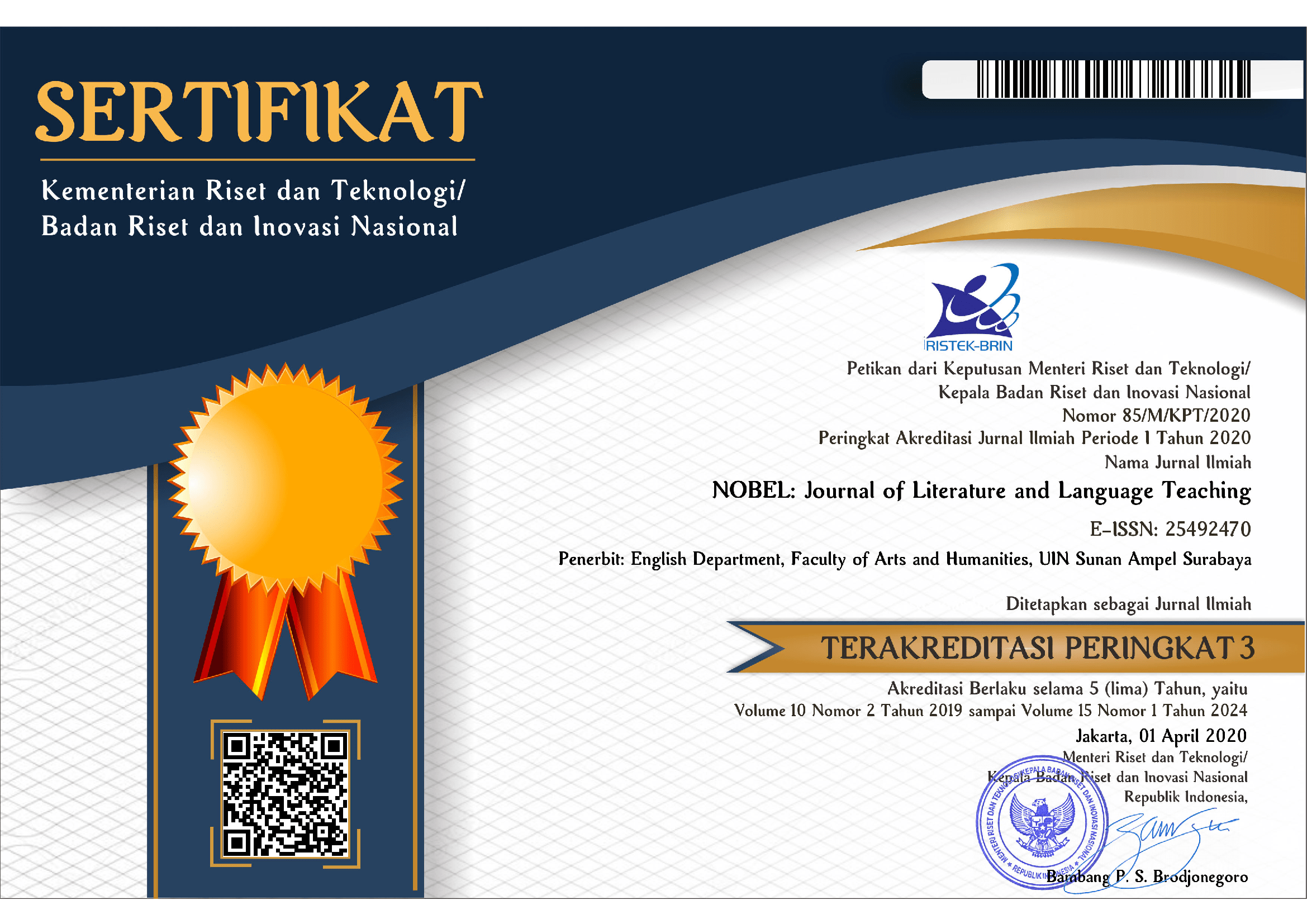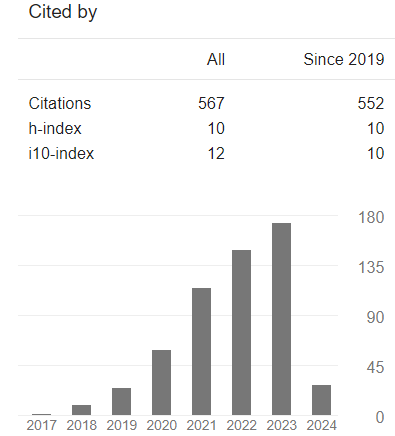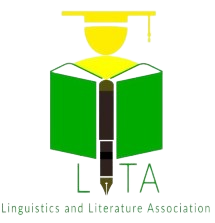Internal Factors of Low ESP Learners’ Motivation to Speak: The Case of Cruise Staff
DOI:
https://doi.org/10.15642/NOBEL.2023.14.2.191-205Keywords:
speaking skills, low motivation, English for Specific Purposes, cruise shipAbstract
Cruise ship companies highly require staff to speak English fluently. Poor speaking performance of the staff members considerably impacts the company’s performance. In this era, many youths enter the realm of cruise ships. Of course, they need to deepen their learning of English from an early age before they plunge into a cruise ship field. However, the youths are not motivated to learn to speak earlier. This situation will be an obstacle that hinders the smooth actualization of educational goals, which refers to preparing individuals mentally to serve themselves and the community, especially for their careers as cruise ship staff. The main objective of this study is to find out the internal factors that cause them to have low motivation to learn to speak English since the beginning of their educational career. In this study, the researchers selected ten youths as participants. The writers analyzed the data qualitatively and explained the findings about this topic descriptively. In sum, the results of this study reveal that the internal factors of low ESP learners’ motivation to speak are low self-confidence to speak in public, nervousness, laziness, shyness to speak, and fear of making speaking mistakes.
Downloads
References
Arroll, B., & Kendrick, T. (2018). Anxiety. In L. Gask, T. Kendrick, R. Peveler, & C. A. Chew-Graham (Eds.), Primary Care Mental Health. Cambridge University Press.
Astuti, D. K. (2012). The gap between English competence & performance (Performance: The Learners` speaking ability). https://smartlib.umri.ac.id/assets/uploads/files/cd4a5-speaking-pdf.pdf
Cruise industry: Everything you need to know about cruises! (2022). Revfine.Com. https://www.revfine.com/cruise-industry/
Dashti, F., Aysha, A. M., & Adey, A. B. (2021). Why are Arabic adult learners in Kuwait afraid of making mistakes in their English classroom? European Scientific Journal ESJ, 17(12), 15–38. https://doi.org/10.19044/esj.2021.v17n12p15
Durga, V. S. S. (2018). The need of English language skills for employment opportunities. Journal for Research Scholars and Professionals of English Language Teaching, 2(7), 1–5. https://www.jrspelt.com/wp-content/uploads/2018/06/Satya-Language-Skills-for-Employment.pdf
Eaton, S. E. (2011). How long does it take to learn a second language?: Applying the “10,000-Hour Rule” as a model for fluency. https://eric.ed.gov/?id=ED516761
Erlina, D., Devitasari, D., Marzulina, L., & Risfina, A. M. (2020). Students’ demotivating factors in English language learning: A case study. Indonesian Research Journal in Education, 4(1), 120–136. https://doi.org/10.22437/irje.v4i1.9024
Fang, F., & Tang, X. (2021). The relationship between Chinese English major students’ learning anxiety and enjoyment in an English language classroom: A positive psychology perspective. Frontiers in Psychology, 12(July), 1–12. https://doi.org/10.3389/fpsyg.2021.705244
Fatmawati, M., Haura, R., & Supiani. (2020). Factors affecting EFL learners’ confidence in speaking English at the MEC English course Banjarmasin. Proceedings of Shepo 2020 (International Conference on Social Sciences & Humanity, Economics, And Politics), 2020, 102–108. https://doi.org/10.31602/.v1i1.3985
Gallego, A., McHugh, L., Penttonen, M., & Lappalainen, R. (2022). Measuring public speaking anxiety: Self-report, behavioral, and physiological. Behavior Modification, 46(4), 782–798. https://doi.org/10.1177/0145445521994308
Hafis, M., & Widya, R. (2021). Psychological factors of EFL students on speaking performance. JIIP - Jurnal Ilmiah Ilmu Pendidikan, 4(4), 266–271. https://doi.org/10.54371/jiip.v4i4.268
Iriani, D. H. (2018). The effect of early English learning on psychology. International Journal of Social Sciences and Humanities (IJSSH), 2(1), 65–74. https://doi.org/10.29332/ijssh.v2n1.82
Kelsen, B. A. (2019). Exploring public speaking anxiety and personal disposition in EFL presentations. Learning and Individual Differences, 73(July), 92–101. https://doi.org/10.1016/j.lindif.2019.05.003
Kukla, D., Pelekh, Y., & Smoleńska, O. (2020). Young generation as future employees. In search of identity in the labor market: Comparative research (Poland and Ukraine). Journal of Physical Education and Sport, 20(2), 1000–1008. https://doi.org/10.7752/jpes.2020.s2140
Marquina Luján, R. J., Huaire Inacio, E. J., Horna Calderón, V. E., Villamar Romero, R. M., & Kishnani García, A. (2021). Attitudes toward learning English and procrastination in students from a private institution specialized in foreign languages in the city of Lima-Peru. Revista Colombiana de Psicología, 30(2), 27–39. https://doi.org/10.15446/rcp.v30n2.83678
Mauliya, I., Relianisa, R. Z., & Rokhyati, U. (2020). Lack of motivation factors creating poor academic performance in the context of graduate English department students. Linguists : Journal Of Linguistics and Language Teaching, 2069(6), 73–85. https://doi.org/10.29300/ling.v6i2.3604
Mohammadian, T. (2013). The effect of shyness on Iranian EFL learners’ language learning motivation and willingness to communicate. Theory and Practice in Language Studies, 3(11), 2036–2045. https://doi.org/10.4304/tpls.3.11.2036-2045
Nadiah, N., Arina, A., & Ikhrom, I. (2019). The students’ self-confidence in public speaking. ELITE Journal, 1(1), 1–12. https://www.elitejournal.org/index.php/ELITE/article/view/7
Najiha, & Sailun, B. (2021). An analysis of students’ speaking anxiety in English classroom at SMAN 2 Siak Hulu. Lectura: Jurnal Pendidikan, 12(2), 218–229. https://doi.org/10.31849/lectura.v12i2.7518
Oteir, I. N., & Al-Otaibi, A. N. (2019). Foreign Language Anxiety: A Systematic Review. Arab World English Journal, 10(3), 309–317. https://doi.org/10.24093/awej/vol10no3.21
Rachim, D. K. N. (2020). Study of the lazy nature of physics students using the quadratic optimal control method. Jurnal Penelitian & Pengembangan Pendidikan Fisika, 6(2), 279–288. https://doi.org/10.21009/1.06214
Rao, P. S. (2019). The importance of speaking skills in English classrooms. Alford Council of International English & Literature Journal(ACIELJ), 2(2), 1–12. https://www.acielj.com/Papers/vol2issue2/1.ACIELJ -Srinu sir (1-12) OK.pdf
Rayah, R. A., Jafre, N. A. M., Husain, N. A., & Nawawi, W. R. W. M. (2018). Attitude and motivation in spoken English among semester 4 students in a Malaysian Polytechnic - a correlational study. EDUCATIO: Jurnal Pendidikan Indonesia, 4(2), 100–107. https://doi.org/10.29210/120182256
Rosenfeld, L. B., Grant, C. H., & McCroskey, J. C. (1995). Communication apprehension and self‐perceived communication competence of academically gifted students. Communication Education, 44(1), 79–89. https://doi.org/10.1080/03634529509378999
Ryan, R. M., & Deci, E. L. (2000). Intrinsic and extrinsic motivations: Classic definitions and new directions. Contemporary Educational Psychology, 25(1), 54–67. https://doi.org/10.1006/ceps.1999.1020
Salmani-Nodoushan, M. A. (2020). English for specific purposes: Traditions, trends, directions. Studies in English Language and Education, 7(1), 247–268. https://doi.org/10.24815/SIELE.V7I1.16342
Sasabone, L., Jubhari, Y., Sukmawati, & Sujarwo. (2021). The implementation of English for Specific Purposes (ESP) in improving students speaking skill of UKI Paulus Makassar. EDULEC: Education, Language, and Culture Journal, 1(1), 1–8. https://doi.org/10.56314/EDULEC.V1I1.1
Sasson, R. (2012). Lack of motivation and enthusiasm. Successconsciousness.Com. http://www.successconsciousness.com/lack-motivation-enthusiasm.htm
Sethuramalingam, V., & Krishnan, S. R. G. (2017). Who are youth ? - The search for a comprehensive definition. Research Directions, 5(3), 1–5. https://www.researchgate.net/profile/S-Rama-Krishnan-2/publication/331701833_Who_are_youth-_The_search_for_a_comprehensive_definition/links/5c888df145851564fad9d4eb/Who-are-youth-The-search-for-a-comprehensive-definition.pdf
Sugiyono. (2016). Metode penelitian kuantitatif, kualitatif, dan R&D. Alfabeta.
Sumarni, S. S., Vianty, M., & Andika, W. D. (2021). Readiness to learn English for early childhood. Jurnal Obsesi: Jurnal Pendidikan Anak Usia Dini, 6(3), 1480–1492. https://doi.org/10.31004/obsesi.v6i3.1805
Sumarsono, D., & Amin, S. (2019). Contextual Teaching Learning (CTL) approach towards students’ self confidence in learning English; does it have any effect? Cordova Journal Language and Culture Studies, 9(2), 207–218. https://doi.org/10.20414/cordova.v9i2.1576
Tridinanti, G. (2018). The correlation between speaking anxiety, self-confidence, and speaking achievement of undergraduate EFL students of private university in Palembang. International Journal of Education and Literacy Studies, 6(4), 35–39. https://doi.org/10.7575/aiac.ijels.v.6n.4p.35
Wang, K., Wang, S., Zhen, L., & Qu, X. (2016). Cruise shipping review: Operations planning and research opportunities. Maritime Business Review, 1(2), 133–148. https://doi.org/10.1108/MABR-04-2016-0007
Wang, S., & Littlewood, W. (2021). Exploring students’ demotivation and remotivation in learning English. System, 103(December), 102617. https://doi.org/10.1016/j.system.2021.102617
Yang, Z. (2017). Study of cruise practice English classroom teaching based on the ESP needs analysis theory. The 2016 International Conference on Modern Management, Education Technology, and Social Science (MMETSS 2016), 91(Mmetss 2016), 432–436. https://doi.org/10.2991/mmetss-16.2017.85
Yulfi, & Aalayina, A. (2021). Students’ motivation in learning English. English Education and Art (LEEA) Journal, 4(2), 2597–3819. https://doi.org/10.31539/leea.v4i2.2256
Downloads
Published
How to Cite
Issue
Section
License
Copyright (c) 2023 NOBEL: Journal of Literature and Language Teaching

This work is licensed under a Creative Commons Attribution 4.0 International License.







